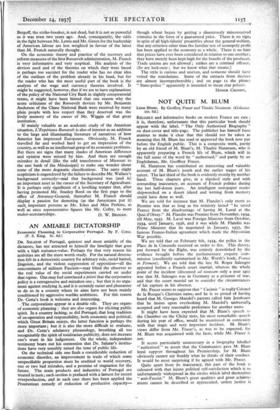THE ONCE "NEW DEAL"
L'Experience Roosevelt et le Milieu Social Americain. Par
M. FRANCIC has earned gratitude in the past by an excellent study of the economic aspects of Italian fascism and many of the merits of his earlier book are present in this one. 'Many, but not all. One defect is only important if one thinks of this book as an explanation of the contemporary American scene. M. Franck does not seem to have been -in America since 5935 and, although that does not diminish the historical value of the picture he paints of the New Deal in its prime, it does make this book of less interest to the student of the actual. For, as Professor Frankfurter told M.- Franck, America changes very fast and many men and many things have changed a great deal since 5935. Mr. Tugwell has followed Mr. Moley in the retreat from Washington ; the stern negatives of the Supreme Court have been modified a good deal this year ; and the whole political scene has been transformed ' by the ignominious collapse of the Republicans (only referred to- here in a note) and by the divisions in the Democratic party created or revealed by the fight over the judiciary bill. Nor is the change confined to politics. Some of the most interesting parts of this book are the reported conversations with American employers whose early-Victorian outlook startled M. Franek as it has startled many others. But since M. Franck has been in America, there have been such marked changes as the acceptance of unionism by United States steel and some of the great motor companies. The breed of Mr. Girdler and of Mr. Rand, the simple-minded employer of Mr. Pearl Bergoff, the strike-breaker, is not dead, but it is not so powerful as it was even two years ago. And, consequently, the odds in the fight between Mr. Lewis and Mr. Green for the leadership of American labour are less weighted in favour of the latter than M. Franck naturally thought.
On the economic theory and practice of the recovery and reform measures of the first Roosevelt administration, M. Franck is very informative and very sceptical. His analysis of the devices used and of the theories on which they were based is perhaps too succinct for the reader who has no clear idea of the outlines of the problem already in his head, but for the reader who has the most useful part of the book is the analysis of the wage and currency theories involved. It might be suggested, however, that if we are to have explanations of the policy of the National City Bank in slightly conspiratorial terms, it might have been hinted that one reason why the acute criticisms of the Roosevelt devices by Mr. Benjamin Anderson of the Chase National Bank were received by many plain people with less respect than they deserved was the lively memory of the career of Mr. Wiggin of that great institution.
If mainly valuable as an academic study of the American situation, L'Experience Roosevelt is also of interest as an addition to the large and illuminating literature of narratives of how America has impressed Europeans. Obviously, M. Franck travelled far and worked hard to get an impression of the country, as well as an intellectual grasp of its economic problems. But there are signs that many shades of American difference and opinion were missed by him. And there are enough mistakes in detail (like the odd transference of Missouri to the east bank of the Mississippi) to make one wonder about some of the more dogmatic classifications. The same slight scepticism is engendered by the failure to describe Mr. Wallace's background correctly—and that background was (and is) an important asset in the career of the Secretary of Agriculture. It is perhaps only significant of a levelling temper that, after having promoted Mr. Stanley Reed on the first page to the office of Attorney-General, thereafter M. Franck should display a passion for demoting (as the Americans put it) such important persons as Mr. Ickes and Miss Perkins, as well as once representative figures like Mr. Colby, to mere



































 Previous page
Previous page